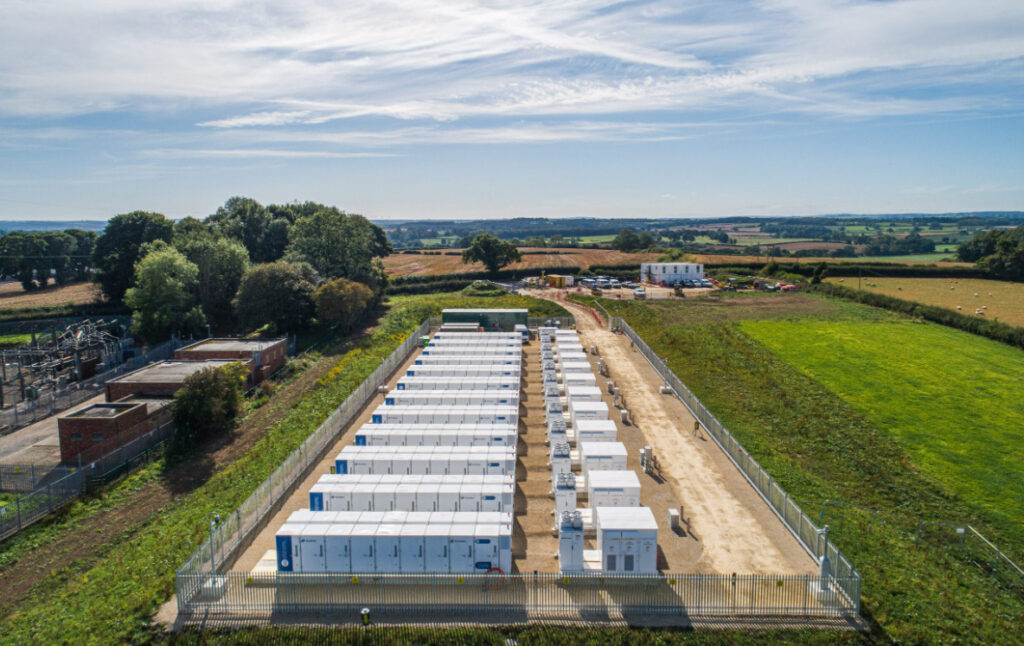
UK BESS fund Harmony Energy Income Trust (HEIT) has progressed the sale of its portfolio to the second round, a process which a source told us raises questions around listed funds’ role in the BESS industry.
The fund announced plans to run a sales process for its entire battery energy storage system (BESS) portfolio in May, when it scrapped its dividend following a period of weaker revenue performance in the UK market. That portfolio now totals 395.4MW/790.8MWh of operational projects.
Enjoy 12 months of exclusive analysis
- Regular insight and analysis of the industry’s biggest developments
- In-depth interviews with the industry’s leading figures
- Annual digital subscription to the PV Tech Power journal
- Discounts on Solar Media’s portfolio of events, in-person and virtual
HEIT said recently (10 October) that the process, run by advisors JLL, has now progressed with select parties invited to move to a second round and negotiations expected to conclude by the end of 2024.
“At this stage there can be no certainty as to whether any assets will be sold, nor the terms of any sale,” its announcement added.
However, a UK BESS developer source told Energy-Storage.news that the company has little choice but to run a sales process because how much its share price has fallen.
Disconnect between stock market value and asset value
The core of the problem is that its market capitalisation, currently £116.86 million (US$152 million) is substantially lower than its net asset value (NAV), which was last recorded at £218.53 million in its interim results from June. The market capitalisation is set by the share price while the NAV is an accounting measure, formed using future cash flow projects based on revenue forecasts.
When HEIT kicked off the process, it said it would demonstrate the “the continuing disconnect with the share price” and the true value of the portfolio.
Our source: “The NAV has been tracking down slowly but as long as it is still higher than the share price valuation, these funds can’t raise any money to buy more assets and launch more construction. It’s a rule in those income trusts that if your share price is below NAV per share you cannot raise money, as you’d be harming your current shareholders. The two need to converge.”
A spokesperson for HEIT and and its investment adviser Harmony Energy said the company would not comment further than its second round announcement when asked by Energy-Storage.news. Harmony Energy is a developer of projects in the UK and abroad, and HEIT has first refusal to acquire those in the UK.
HEIT could wait for revenues to bounce back, which consultancy Cornwall Insight this week forecast would happen by 2026, but “that could take some time”, our source said.
Selling the portfolio would both bring in a lot of cash to proceed with new BESS projects but also bring the share price and NAV back together. It could also, HEIT has suggested, prove that disconnect between the public markets and private markets valuation of the BESS portfolio. But that disconnect might always be there.
Is BESS too volatile for a publicly listed fund?
“The bigger question this whole thing raises is whether these funds are the best way to raise money in the market for BESS projects,” our source adds. “Their structure works well for renewables like solar which pay out regularly, but BESS are fundamentally volatility assets, so you need investors that understand you might have 12 bad months and then 12 great ones.”
A second source we spoke to, an advisor, took a different view. They said that income trust funds like HEIT could work for storage but they need to bring in floors and tolls to their contracting structures, in order to stabilise revenues and reduce investment risk. This would bring them in line with renewable generation income trust funds, which work well.
The two other UK-listed BESS funds are the Gore Street Energy Storage Fund (which trades under the GSF ticker) and the Gresham House Energy Storage Fund (GRID), both of which have also seen their share prices fall to below substantially below their NAV.
GRID has moved towards using tolls, as our advisor source suggested, contracting with utility Octopus Energy for a fixed-price, two-year deal for half of its portfolio.
GSF’s market capitalisation is £308.1 million versus a NAV of £541 million (as of June 2024), while GRID’s market capitalisation stands at £271.93 million versus £621.2 million (also as of June 2024), at the time of writing on 30 October.
The drivers behind the HEIT sales process are the same as those that saw a flurry of M&A activity in the non-listed BESS owner-operator space in late 2023/early 2024, with Statera, Banks Renewables, Zenobē and GRID’s manager Gresham House all changing hands in late 2023.
How is the sale progressing?
Our advisor said the sale has progressed well and buyers have expressed strong interest, but that there are conflicting drivers that will determine whether HEIT achieve its goal of demonstrating the portfolio is worth more than its market capitalisation.
On the one hand, centre-left Labour winning in this year’s general election and its rapid moves to support the UK’s clean energy industry will reinforce the drivers making storage a fundamental future part of the future electricity system.
On the other, the substantial falls in the capex of BESS projects in the past 12-18 months could make an already-operational portfolio less attractive than building new ones. “The question of whether you buy assets which are already built or invest in new projects that will be built for a substantially comparatively lower capex is an interesting one,” they said.
In terms of a likely buyer, they expect a ‘big ticket’ investor that is slightly more risk-averse, these being already-operational projects, and one with “an existing small presence or foothold in the UK market, rather than a totally new player”.
Harmony Energy is also active outside the UK, particularly in France and Poland.

